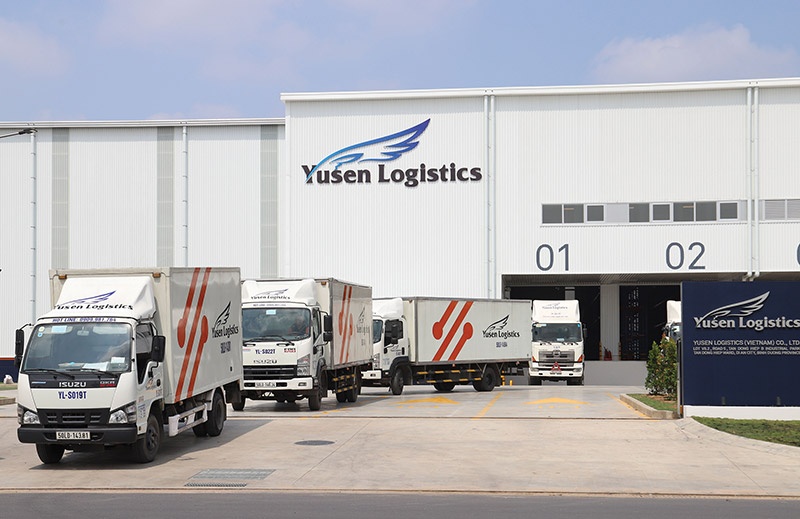Logistics companies wait on next fuel prices tweaks
 |
| Transportation and logistics groups are buckling under the stress of fuel hikes. Photo: Le Toan |
The MoF is also being asked to evaluate carefully the impact of these reductions on the state budget. After consecutive increasing momentum for many months, the selling prices of petrol and gas were adjusted twice in early July, dropping to the lowest rate in five months as global rates decline.
Total taxes and other costs for fuel products in Vietnam account for 28-35 per cent of the retail price. In the current structure of fuel retail prices, each litre of petrol and oil covers four kinds of taxes – 10 per cent import tax; 10 per cent VAT; an environmental protection tax of VND1,000 (4.3 US cents) per litre; and an excise tax of 10 per cent for RON95 petrol, 8 per cent for E5 petrol, and 7 per cent for E10 petrol. Oil products are exempt from this tax.
The MoF also said that early this month, it had proposed reducing the most favoured nation (MFN) tariff for unleaded petrol from 20 to 10 per cent, instead of 12 per cent as per the initial proposal. The MFN tariff is a standard rate applied in trading between World Trade Organization members unless a separate trade agreement exists. Under free trade deals between Vietnam and South Korea and within ASEAN, the import tariff on gas is about 8 per cent.
According to MoF’s explanation, although the proposal for MFN tariff reduction would not help to lower the selling price of gas imported from South Korea and ASEAN, it would contribute to diversifying supply sources for imported fuel.
The business community, especially logistics companies, are anxious to see reductions in the selling price of gasoline.
Alex Nguyen, director of Legend Cargo Logistics Co., Ltd., told VIR that it would be good news for the business community. “We often sign 1-year contracts with international partners, so when the selling price of gasoline sees a dramatic change, we can’t negotiate with partners to adjust the freight in such a short time. Partners sympathise with us, but they fix the selling prices of products before they negotiate freight levels, so getting a big change in freight is impossible.”
Legend Cargo Logistics ranks in the top 10 of Vietnam’s freight forwarding companies, especially for freight services from Vietnam to the booming North American market through its range of logistics services, according to trade database group Datamyne. In the context of the consecutive volatility in the selling price of gas, Nguyen believed that only large-scale logistics groups have the financial capacity and experience to maintain operations.
The rises in the cost of fuel have caused a burden for transportation businesses, especially road transport logistics groups, because it accounts for between 30-40 per cent of transport costs for containers and heavy trucks. Road transport service providers also suffer many other fees such as wharf, road maintenance fees, and more. According to the Vietnam Logistics Business Association, 95 per cent of active logistics companies in Vietnam are local businesses, most of them on a small- or medium-sized scale, thus their competitive capacity is weak.
What the stars mean:
★ Poor ★ ★ Promising ★★★ Good ★★★★ Very good ★★★★★ Exceptional
Related Contents
Latest News
More News
- PM outlines new tasks for healthcare sector (February 25, 2026 | 16:00)
- Ho Chi Minh City launches plan for innovation and digital transformation (February 25, 2026 | 09:00)
- Vietnam sets ambitious dairy growth targets (February 24, 2026 | 18:00)
- Masan Consumer names new deputy CEO to drive foods and beverages growth (February 23, 2026 | 20:52)
- Myriad risks ahead, but ones Vietnam can confront (February 20, 2026 | 15:02)
- Vietnam making the leap into AI and semiconductors (February 20, 2026 | 09:37)
- Funding must be activated for semiconductor success (February 20, 2026 | 09:20)
- Resilience as new benchmark for smarter infrastructure (February 19, 2026 | 20:35)
- A golden time to shine within ASEAN (February 19, 2026 | 20:22)
- Vietnam’s pivotal year for advancing sustainability (February 19, 2026 | 08:44)

 Tag:
Tag:




















 Mobile Version
Mobile Version